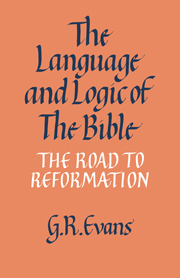Book contents
- Frontmatter
- Contents
- List of abbreviations
- List of sources
- Biographical notes
- Introduction
- I Scripture's divine warrant
- 1 ‘Scripture hath for its author God himself’
- 2 The human authors of Scripture
- 3 Handing on and explanations
- 4 Sola scriptura
- 5 Towards private judgement: ‘The children of God spy out their father’
- II The rules of interpretation
- III Practical interpretation
- Conclusion
- Notes
- Select bibliography
- Index
2 - The human authors of Scripture
from I - Scripture's divine warrant
Published online by Cambridge University Press: 12 October 2009
- Frontmatter
- Contents
- List of abbreviations
- List of sources
- Biographical notes
- Introduction
- I Scripture's divine warrant
- 1 ‘Scripture hath for its author God himself’
- 2 The human authors of Scripture
- 3 Handing on and explanations
- 4 Sola scriptura
- 5 Towards private judgement: ‘The children of God spy out their father’
- II The rules of interpretation
- III Practical interpretation
- Conclusion
- Notes
- Select bibliography
- Index
Summary
‘Canonical Scripture, both Testaments, that is, is believed to have been written by the Holy Spirit dictating and inspiring it (dictante et inspirante)’, says Gabriel Biel a century before the Reformation.
The words of the Bible were written down by human authors. Did they do so with a full understanding of what they were writing? Did the inspiration of the Holy Spirit extend to every letter they wrote or only to a general indication of what they were to say? Did the Holy Spirit intend every part of Scripture to be received in the same way, or are there levels of importance in the various parts of the Bible? Did the Holy Spirit supervise the transmission of the text at every stage, including its subsequent translation? Does he still do so? These questions arose in the Middle Ages with some force, but with an urgency masked to some extent by an overriding concern with the divine authorship of God himself and the implications of that divine authority for what the Bible says.
Following Augustine and Gregory, mediaeval authors had usually striven to see discrepancies in the text as evidences that God adapts himself to men in their limited and confused understanding. The notion that its oddities might be the result of human error uncorrected by the Holy Spirit was slow to take hold, although, as we shall see, there were some traces of it in later mediaeval discussions.
- Type
- Chapter
- Information
- The Language and Logic of the BibleThe Road to Reformation, pp. 15 - 19Publisher: Cambridge University PressPrint publication year: 1985



